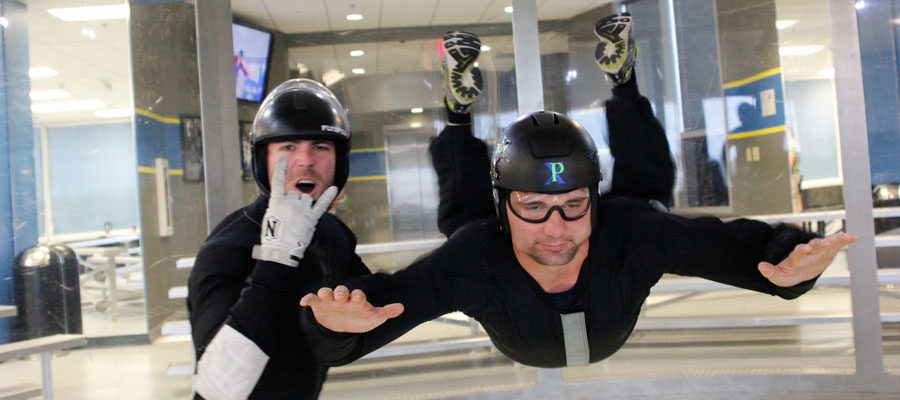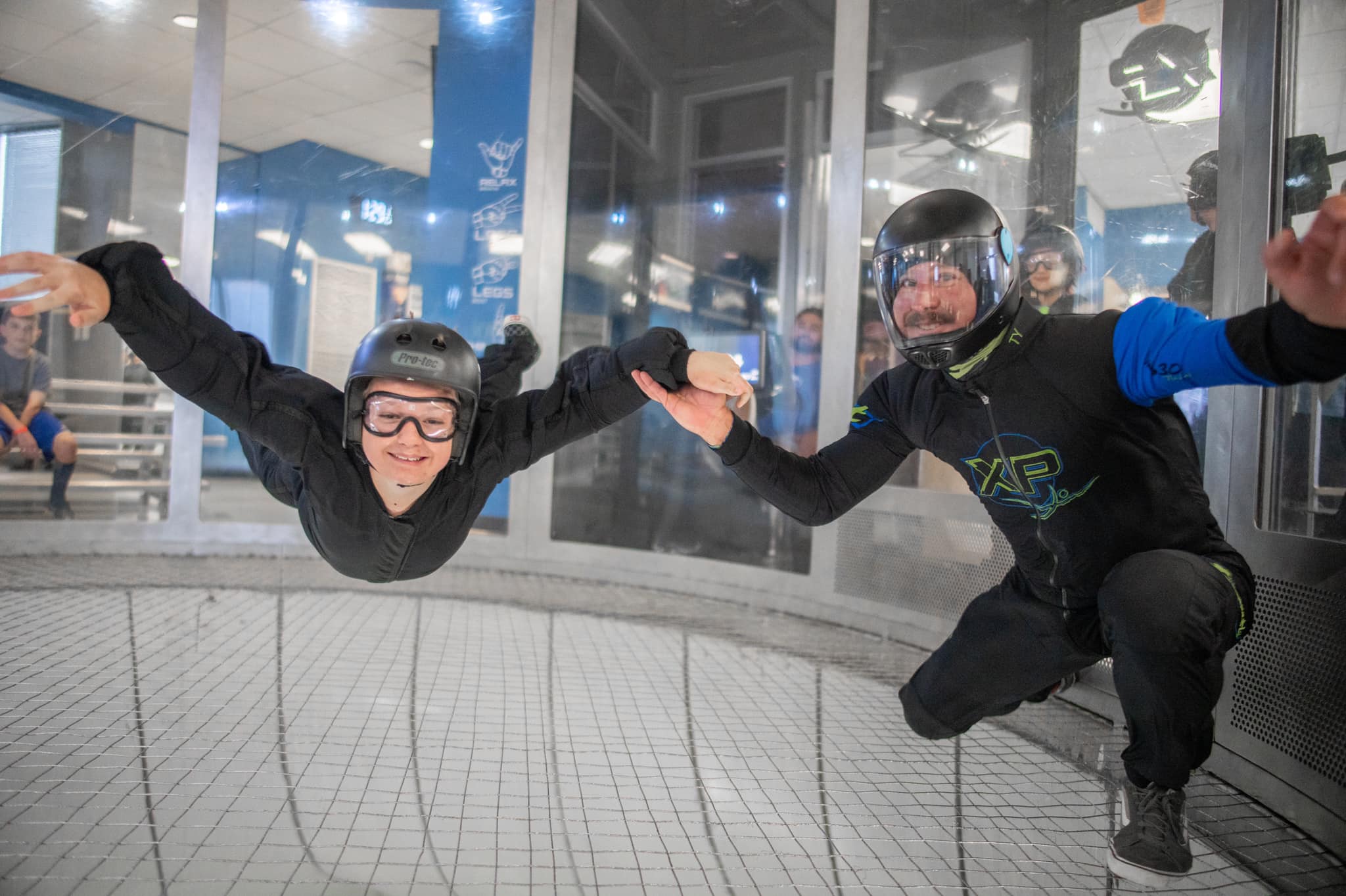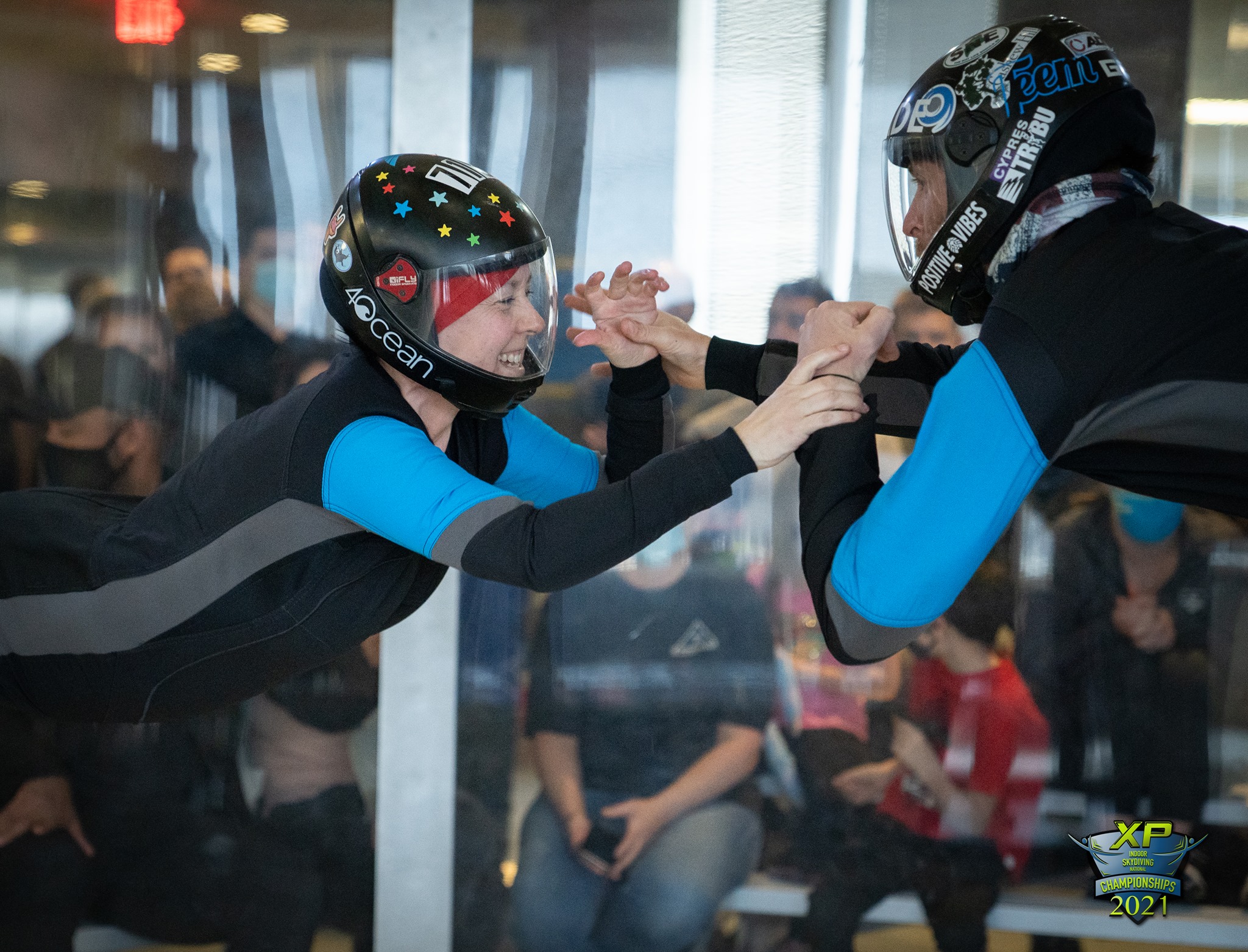
Indoor Skydiving: What To Expect
Wednesday, August 16, 2023
- Team XP
- 8/16/23
- 2
- Indoor Skydiving
Think of indoor skydiving like riding on the breeze from a ginormous hairdryer. Sounds fun, right? This article will bust open some common myths about indoor skydiving, give you the confidence to try it, and determine how closely it relates to the real deal. Let’s jump into some frequently asked questions about tunnel flight and breakdown how to indoor skydive, the Paraclete XP way!
1. Is Indoor Skydiving Dangerous?
How does indoor skydiving work? The first time you fly, a certified wind tunnel instructor is with you the entire time (and can grab a hold of you) for the duration of the flight time, which is one way we put safety first for all our first time flyers. Bumps, bruises, and some soreness are the most common risks associated with indoor skydiving – and of course, addiction to the world of tunnel flying!
Have you been wondering about the safety of indoor skydiving because you’ve heard people say, “Why does my body hurt after indoor skydiving?” We’re happy to report that this is not a safety issue, it’s normal! Indoor skydiving requires the body to bend and move in ways that are initially unnatural, and it takes a while for those muscles to build up resistance to the wind. When we move muscles that aren’t used to working, lactic acid is released into them, and this is what causes us to have that satisfactory soreness.

2. Can Anyone Go Indoor Skydiving?
While the minimum age to skydive from an airplane is 18 years old, the minimum age requirement for indoor skydiving is only three years old. So, is indoor skydiving as scary as it seems? Nope – people can do it before they even start kindergarten!
The weight requirement for indoor skydiving here at Paraclete XP is 250lbs. At our dropzone – Skydive Paraclete – our weight limit for skydiving from an airplane is 230-250 lbs. Why? Safety! Skydivers and indoor skydivers place safety at the top of their mind during every single jump or flight. It is critical that our instructors feel confident and capable of taking control of any and every situation to ensure an exceptionally safe and fun time for their students. We, along with the entire skydiving industry, never intend to make anyone feel excluded by our safety standards.
3. What Does Indoor Skydiving Feel Like?
In layman’s terms, indoor skydiving is made possible by a giant tube that fills with fast flowing air from massive fans. The best way we can put it for someone who hasn’t skydived is this: imagine standing on top of a car (magically secured!) while flying down the interstate at about 120 mph. You may be thinking, “Well that sounds very unenjoyable.” Wrong! It induces a feeling that is close to weightlessness!
Or maybe, “Can you breathe while indoor skydiving?” Yes! There’s plenty of air and it’s self-serve. Another common question we get is, “Does indoor skydiving feel like a roller coaster?” Nope. Fun fact: real skydiving freefall doesn’t either! The portion of real skydiving that has the potential to induce that ‘stomach in your throat’ feeling is the parachute ride, so you have nothing to worry about while tunnel flying.
4. How Do I Prepare for Indoor Skydiving?
Book your flight time and relaxxxx! An awesome attribute of indoor skydiving is giving the freedom of flight to people with no prior experience. If you’re super worried about doing it right, do some gentle stretches and practice the arch.
The arched position is the most common and first-taught skydiving position, and entails flying belly-to-earth. Our hips (belly) are our center of gravity, so if we push that part of our bodies most towards the earth, we’re able to stay stable. Imagine doing the Superman pose on the floor, or making yourself look like a banana – that’s the arch!

5. How Long Before My Indoor Skydive Do I Arrive?
We request you arrive at our facility 45 minutes prior to your scheduled indoor skydive! We want to ensure you don’t feel rushed, go through our check-in process, and feel relaxed before receiving a basic briefing and gearing up for your flight! We’ll also set you up with one of our must-have indoor skydiving video options.
6. What Is The Process After Arrival?
After you arrive, we’ll give you a pre-flight briefing about how to have the most successful, safe, and fun indoor skydiving experience. Interestingly, the pre-jump brief for a real skydive takes about the same amount of time!
Our instructors will discuss how to arch and go over some simple hand signals with you. These hand signals are what skydiving coaches use to communicate with students in the sky and the tunnel. They can tell their students to arch harder, straighten their legs, or move their arms without even speaking a word.

7. Is Indoor Skydiving Worth the Money?
Hands down – yes! Although indoor skydiving prices seem steep at first, you get a lot of bang for your buck. The indoor skydiving cost varies between first time flyers and veterans. Many people think, “Oof, TWO MINUTES for that much!? No thanks.” But think about it – a real skydive is hundreds of dollars (and sooo worth it!) and guess how much freefall time you get? Less than two minutes.
Does indoor skydiving feel like the real thing? The indoor skydiving experience is designed to simulate the freefall portion of a real skydive and avid skydivers regularly utilize the wind tunnel to practice, so yes! Two minutes of indoor skydiving equates to about two freefalls in real life.
8. When Can I Go Indoor Skydiving?
Right now! If you meet our wind tunnel requirements, book your indoor skydive today!
People passionately pursue skydiving and tunnel flying because of the joy it brings them. We can’t wait for you to experience it for yourself! As always, reach out with questions or concerns. We’re here to help!
Tags: indoor skydiving, Raleigh
2 Comments
Comments are closed.
Copyright © 2024, Paraclete XP Indoor Skydiving, All Rights Reserved.
DropZone Web Design & Marketing by Beyond Marketing, LLC

Can two people do this atty one time?
Hi Shameka, if you’re experienced in the wind tunnel, two people can fly together. If you’re relatively new, flying with an instructor would be required as two novice flyers could injure each other. Hope this helps!